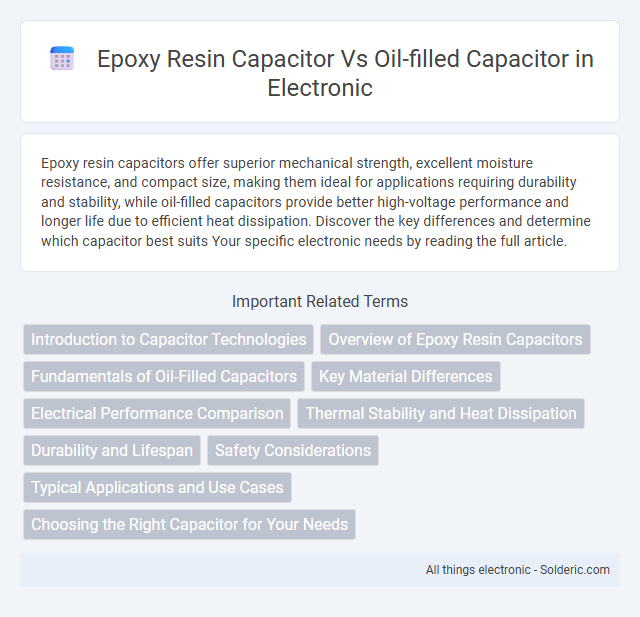Epoxy resin capacitors offer superior mechanical strength, excellent moisture resistance, and compact size, making them ideal for applications requiring durability and stability, while oil-filled capacitors provide better high-voltage performance and longer life due to efficient heat dissipation. Discover the key differences and determine which capacitor best suits Your specific electronic needs by reading the full article.
Comparison Table
| Feature | Epoxy Resin Capacitor | Oil-Filled Capacitor |
|---|---|---|
| Dielectric Medium | Epoxy resin | Mineral or synthetic oil |
| Size | Compact and lightweight | Larger due to oil insulation |
| Voltage Rating | Up to medium voltage applications | High voltage applications |
| Insulation Quality | Good thermal stability | Excellent insulation and cooling |
| Reliability | Resistant to moisture and vibrations | Susceptible to oil leaks and maintenance |
| Environmental Impact | Eco-friendlier, no toxic fluids | Contains oil, potential environmental hazard |
| Maintenance | Low maintenance | Requires periodic oil checks |
| Typical Applications | Consumer electronics, lighting | Power transformers, high voltage systems |
Introduction to Capacitor Technologies
Epoxy resin capacitors utilize a solid epoxy compound as the dielectric and encapsulating material, offering enhanced mechanical strength, moisture resistance, and thermal stability compared to oil-filled capacitors, which use liquid insulating oil to achieve high capacitance and reliable self-healing properties. Oil-filled capacitors excel in high voltage and high pulse applications due to their superior electrical insulation and thermal dissipation capabilities, while epoxy resin capacitors are preferred for compact, robust designs in harsh environmental conditions. The choice between epoxy resin and oil-filled capacitor technologies depends on application-specific requirements such as voltage rating, environmental exposure, size constraints, and reliability demands.
Overview of Epoxy Resin Capacitors
Epoxy resin capacitors feature a solid dielectric material made from epoxy resin, providing exceptional moisture resistance and mechanical strength ideal for high-reliability electronic applications. These capacitors offer stable electrical characteristics, low leakage currents, and enhanced thermal stability, making them suitable for use in precise circuits and harsh environmental conditions. Compared to oil-filled capacitors, epoxy resin types exhibit improved safety due to the absence of liquid dielectric, reducing environmental risks and maintenance needs.
Fundamentals of Oil-Filled Capacitors
Oil-filled capacitors use a dielectric medium consisting of mineral oil or synthetic oil, enhancing insulation properties and heat dissipation compared to epoxy resin capacitors. The oil acts as a coolant and filler, minimizing dielectric losses and improving voltage stability under high stress conditions. This results in higher reliability and longevity in high-voltage and high-temperature applications, distinguishing oil-filled capacitors from epoxy resin variants.
Key Material Differences
Epoxy resin capacitors use a solid epoxy resin as the dielectric and encapsulating material, providing excellent moisture resistance and mechanical stability, while oil-filled capacitors contain a liquid dielectric oil that offers superior insulation and heat dissipation. The solid nature of epoxy resin enhances durability and reduces the risk of leaks, in contrast to oil-filled capacitors, which require careful sealing to prevent oil contamination. Your choice should consider the operating environment and reliability requirements, as epoxy resin capacitors perform better in compact, high-vibration applications, whereas oil-filled types excel in high-voltage and high-current scenarios.
Electrical Performance Comparison
Epoxy resin capacitors offer superior insulation resistance and lower dielectric losses compared to oil-filled capacitors, enhancing overall electrical performance in high-frequency applications. Oil-filled capacitors excel in voltage endurance and self-healing properties, making them reliable under high-voltage stress and transient conditions. Understanding these differences helps you select the ideal capacitor type based on your circuit's frequency and voltage requirements.
Thermal Stability and Heat Dissipation
Epoxy resin capacitors exhibit superior thermal stability due to their solid encapsulation, which enhances heat dissipation and prevents internal moisture ingress that can degrade performance. Oil-filled capacitors rely on mineral oil for cooling, providing effective heat dissipation but posing higher risks of leakage and environmental concerns. Your choice depends on the application's thermal demands and maintenance preferences, with epoxy resin capacitors offering more robust heat resistance in compact, sealed designs.
Durability and Lifespan
Epoxy resin capacitors offer superior durability due to their robust solid encapsulation, which protects internal components from moisture and mechanical stress. Oil-filled capacitors typically provide longer lifespan under high-voltage and high-temperature conditions, but they are more susceptible to leaks and maintenance issues over time. Your choice should consider the operating environment to maximize the capacitor's reliability and service life.
Safety Considerations
Epoxy resin capacitors offer superior insulation and resistance to moisture, reducing the risk of short circuits and electrical failures compared to oil-filled capacitors. Unlike oil-filled capacitors, which pose potential fire hazards due to flammable dielectric oil, epoxy resin capacitors are non-flammable and environmentally safer. Your choice of capacitor impacts overall system safety, especially in environments sensitive to leaks and fire risks.
Typical Applications and Use Cases
Epoxy resin capacitors are commonly used in high-frequency circuits, telecommunications, and precision electronic devices due to their excellent insulation properties and durability in compact designs. Oil-filled capacitors find typical applications in power factor correction, industrial motor drives, and high-voltage power transmission systems because of their superior thermal management and high-voltage handling capabilities. The choice between epoxy resin and oil-filled capacitors depends heavily on operating voltage requirements, environmental stability, and frequency characteristics in specific use cases.
Choosing the Right Capacitor for Your Needs
Epoxy resin capacitors offer excellent mechanical strength, moisture resistance, and thermal stability, making them ideal for applications requiring durability and high insulation resistance. Oil-filled capacitors provide superior dielectric properties and high voltage handling, suited for high-power and high-frequency environments. Your choice depends on factors like operating voltage, environmental conditions, and reliability requirements to ensure optimal performance and longevity.
epoxy resin capacitor vs oil-filled capacitor Infographic

 solderic.com
solderic.com